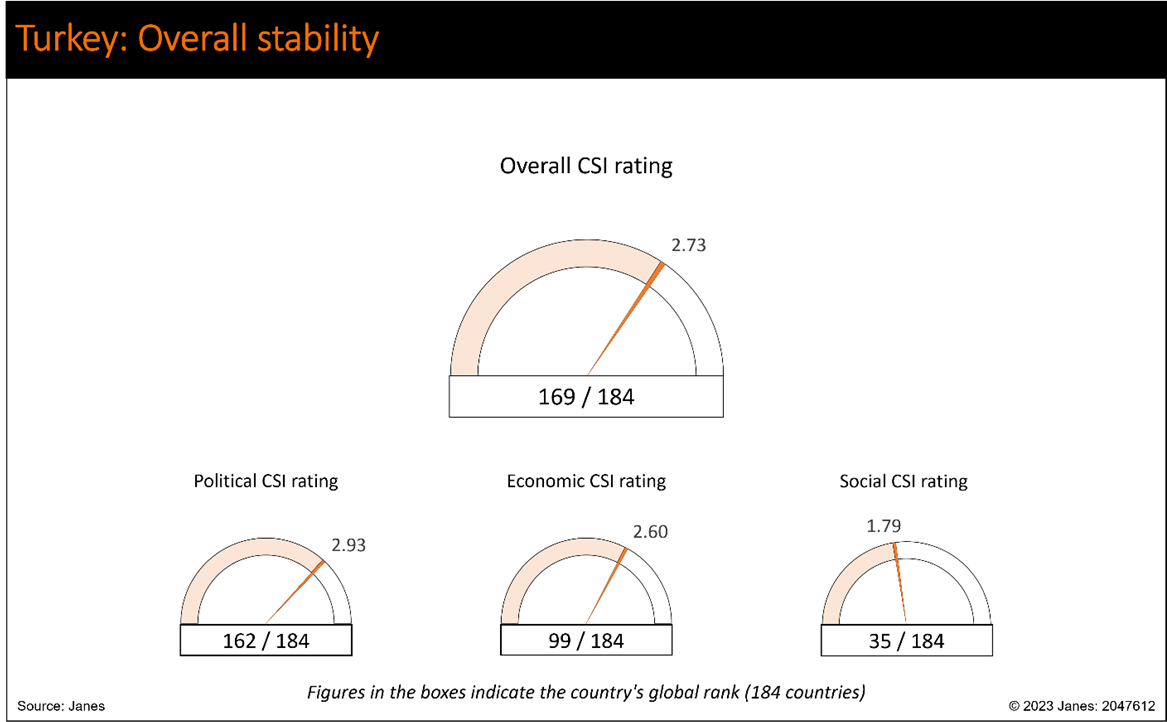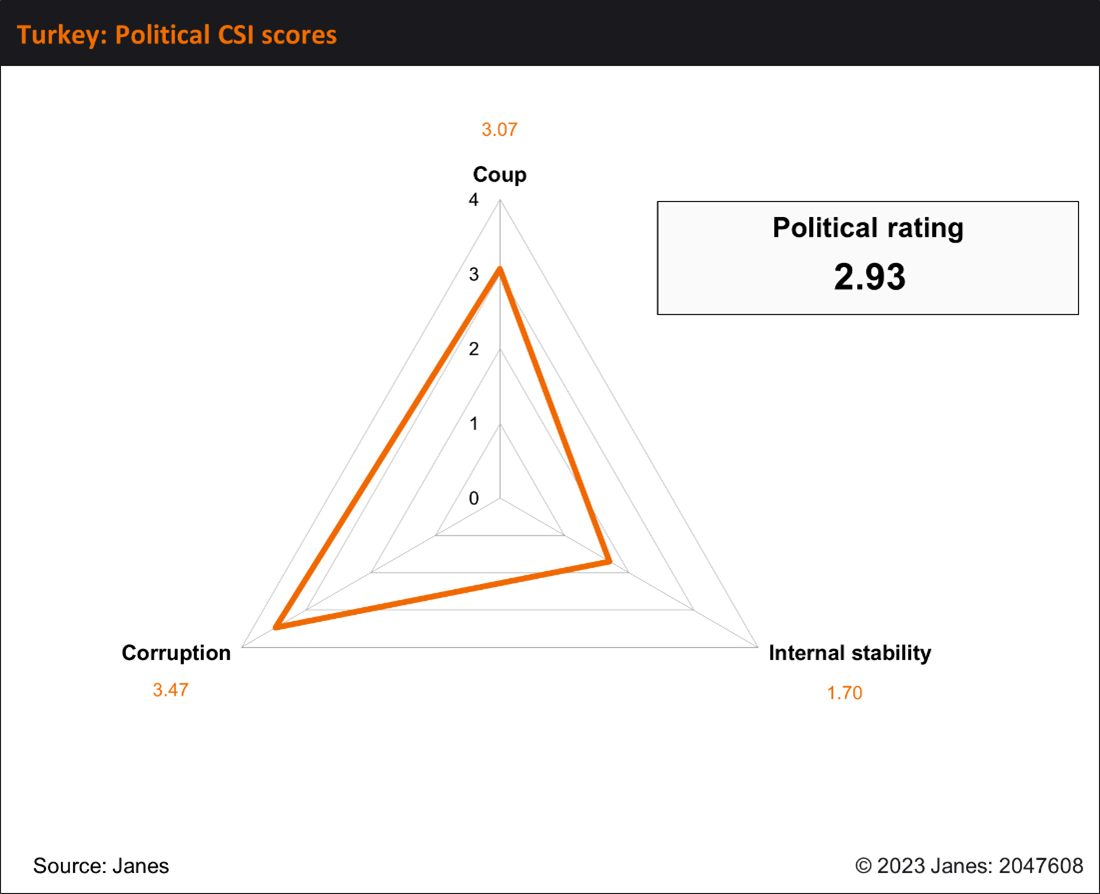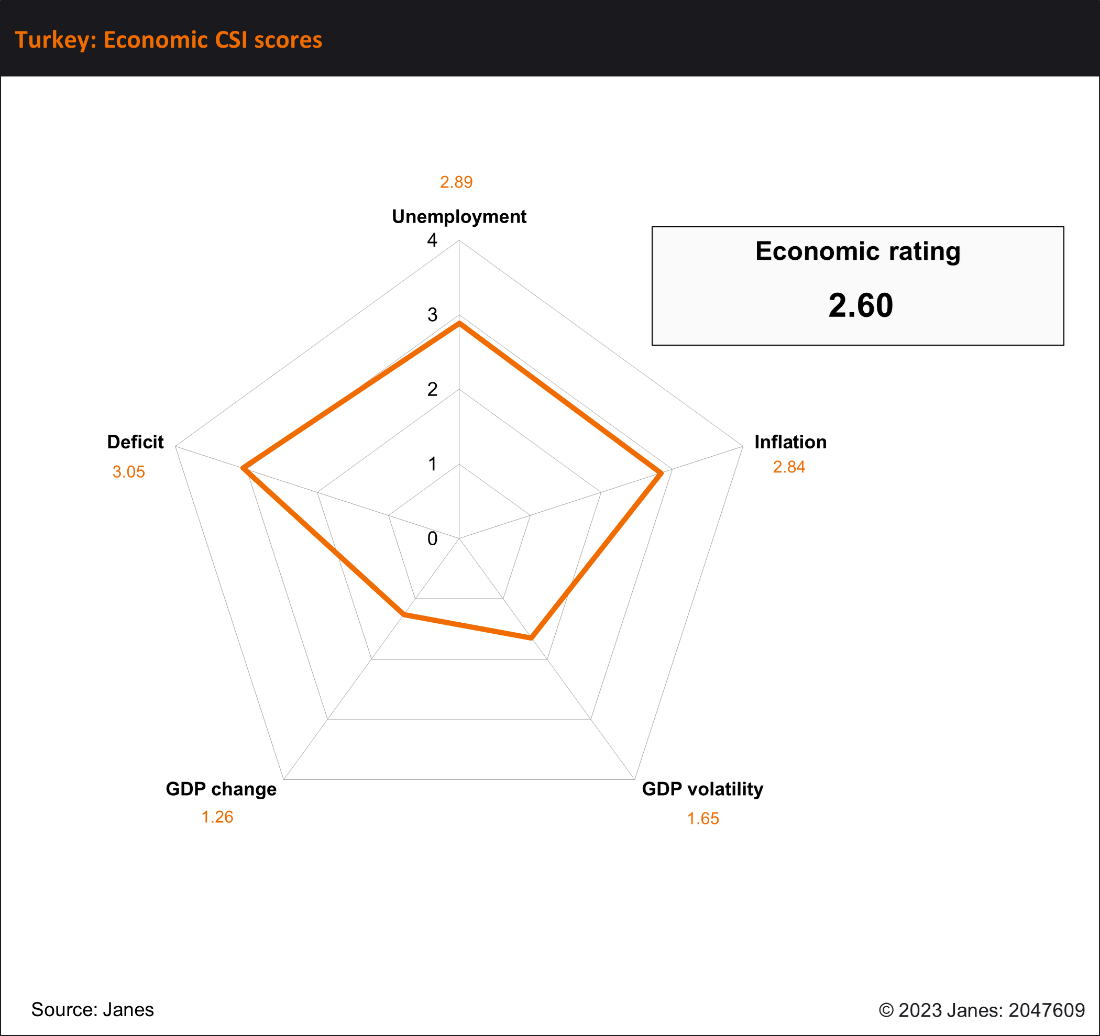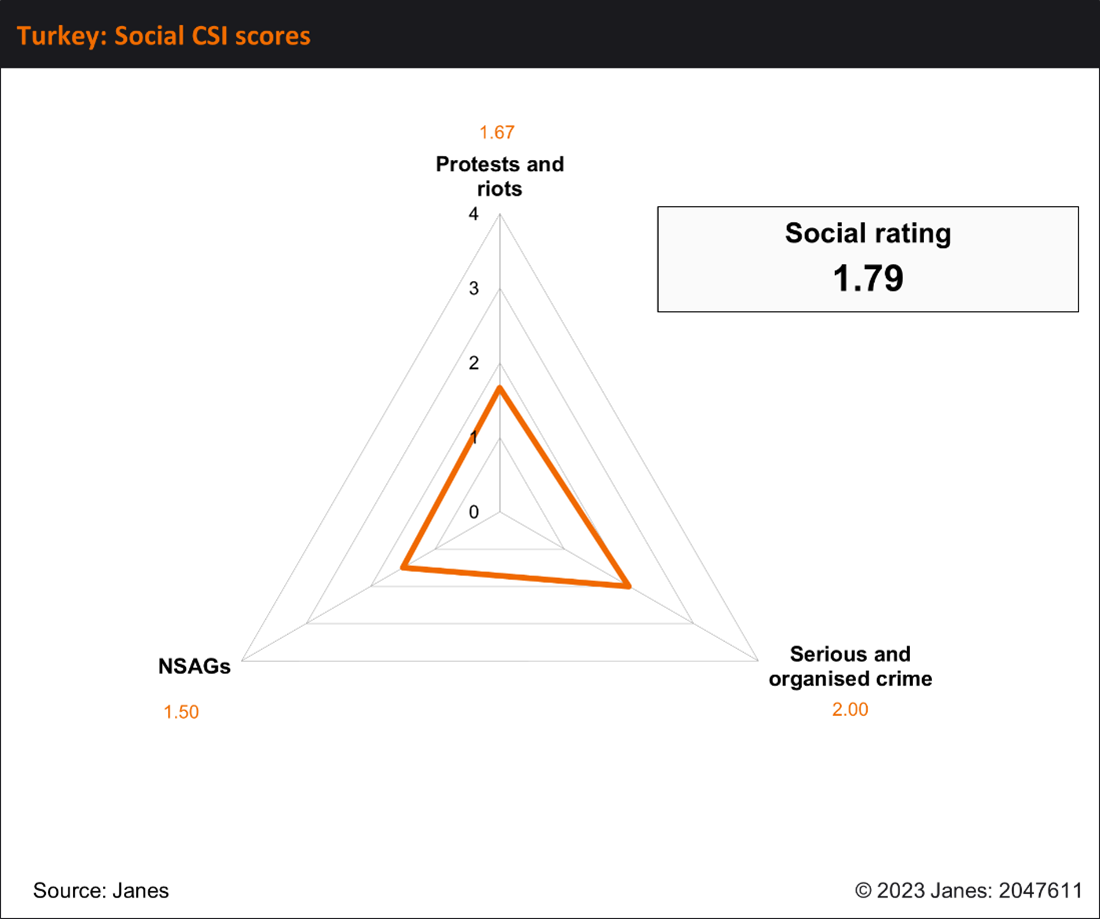- About
- Intara
- Capabilities
- Advisory
- Resources
- News
- Store
05 June 2023
Country Overview: Turkey
Janes Country Stability Indicators (JCSI)
 |
|
Janes Country Stability Indicators are available with our Country Intelligence capability for 184 countries. To find out more visit: Country Assessments (janes.com)
Overall stability
Turkey has an overall stability rating of 2.73/4 (4= very high country instability) and a global rank of 169/184 (184=highest country instability). Janes assesses that the country faces a high risk of disorderly government collapse, forceful transfer of power, or fragmentation of state power, which may lead to societal unrest and violence.

Political stability
Janes assesses that the political situation in Turkey presents a high risk of disorderly government collapse, forceful transfer of power, or fragmentation of state power, which may lead to social unrest and violence. Turkey scores 2.93/4.

| Risk indicator | Score | Scoring definition |
| Corruption | 3.50 | High level of perceived corruption, presenting a high risk of disorderly government collapse, forceful transfer of power, fragmentation of power, or societal unrest and violence. |
| Coups | 3.07 | High military coup risk, presenting a high risk of a country’s government facing progressing military coup threat that may lead to a forceful transfer of power. |
| Internal stability | 1.70 | Low internal stability risk, presenting a low risk of disorderly government collapse, forceful transfer of power, or fragmentation of power, which may lead to societal unrest and violence. |
Political stability assessment
Corruption is almost certain to continue to pose the most significant threat to Turkey's political stability. The AKP government launched the “Strategic Plan on Reducing Corruption and Enhancing Transparency”, however, according to Transparency International, the anti-corruption campaign has not been successful. According to the European Commission in 2021, there is a “lack of will to fight decisively against corruption”. According to Transparency International’s survey, conducted in January-February 2016, 8% of public service users had paid a bribe in the past 12 months. In the Council of Europe’s third interim compliance report in 2022, Turkey was found to have implemented only three of 22 anti-corruption recommendations. Corruption in Turkey impacts the business environment severely, with regulations being applied inconsistently and government procurement has often given preference to AKP-supporting businesses.
Turkey has a history of coups in which the Turkish Army, considering itself a guardian of the state, has overthrown democratically elected governments. The most recent attempted coup was in 2016, which failed, and President Erdoğan proceeded to purge the military of over 23,000 perceived political threats. Since the failed coup, the Justice and Development Party (AKP) have removed secular officers and increased the influence of religion in the Turkish military. Barriers to entry for minority and secular applicants, as well as barriers to promotion for existing secular and minority members of the military, have increased. As a result, the demographic that typically supports the AKP now dominates the military. After the 2016 coup, the duties of the Army’s Presidential Guard were handed over to the Police Special Operations Teams, acting as a counterbalancing force for any coups originating from the Army.
Internal stability is unlikely to be a leading cause of government collapse in Turkey. Most protests do not demand the overthrow of the ruling party. Many protests are organised by supporters of the current ruling alliance, the AKP-MHP, against the opposition of the current government, such as the HDP or the CHP. Protests that do occur against the actions of the government are largely found in the Kurdish-dominated southeast of the country. Democratically elected, HDP-affiliated mayors have been arrested or detained and replaced with “trustees” aligned with the government. According to Freedom House, since the 2016 coup attempt, Erdoğan has replaced tens of thousands of civil servants, judges, and prosecutors with political loyalists. Despite the Erdogan administration’s authoritarian tendencies, elections in Turkey were described as “free” by the Organization for Security and Cooperation in Europe’s observer mission but were not considered “fair” due to a media environment that is very strongly aligned with the government.
Economic stability
Janes assesses that the economic situation in Turkey presents a moderate risk of disorderly government collapse, forceful transfer of power, or fragmentation of state power, which may lead to social unrest and violence. Turkey scores 2.60/4 (4=very high economic risk).

| Risk indicator | Score | Scoring definition |
| GDP adjusted change | 1.26 | Low GDP change risk, presenting a low risk of disorderly government collapse, forceful transfer of power, or fragmentation of power, which may lead to societal unrest and violence. |
| Unemployment | 2.89 | High unemployment risk, presenting a high risk of disorderly government collapse, forceful transfer of power, or fragmentation of power, which may lead to societal unrest and violence. |
| Inflation | 2.84 | High inflation risk, presenting a high risk of disorderly government collapse, forceful transfer of power, or fragmentation of power, which may lead to societal unrest and violence. |
| GDP volatility | 1.65 | Low GDP volatility risk, presenting a low risk of disorderly government collapse, forceful transfer of power, or fragmentation of power, which may lead to societal unrest and violence. |
| Deficit | 3.05 | High deficit and / or default risk, presenting a high risk of disorderly government collapse, forceful transfer of power, or fragmentation of power, which may lead to societal unrest and violence. |
Economic stability assessment
The greatest economic threats to Turkey’s stability are its current account deficit, inflation, and unemployment. Turkey suffers from an ongoing debt and currency crisis. Turkey’s debt and currency crisis has been exacerbated by the Erdogan administration’s unorthodox monetary policy, as the central bank of Turkey lacks independence from political decision-making.
Turkey's high unemployment threatens stability, at 10 % according to the World Bank in 2022, which deepens income inequality and is likely to fuel social unrest. There is significant youth unemployment in Turkey, 22.6% in 2021 according to World Bank data, which impacts the prospects of social mobility for the youth and is consequently likely to be another cause of social instability. The threat of unemployment is magnified by Turkey’s low public social spending, at 12.4% of GDP in 2022, the second lowest in OECD countries and below the average of 21.1%.
Inflation poses a significant threat to stability in Turkey. Turkey’s annual inflation reached a rate of 64.3% in December 2022, according to the Central Bank of the Republic of Turkey. The high inflation has increased the cost of living and is worsening income equality: According to the World Inequality Database, in 2021 those in the top 10% of earners earn 51.7% of national income, whereas the bottom 50% earned 14.2% of national income.
Turkey's fiscal deficit is another contributor to the risk of economic instability in Turkey. Turkey has been running a deficit since 2007. Turkey had a deficit of 3.4% in 2020, 2.8% in 2021, and 0.9% in 2022, according to Turkey’s Ministry of Treasury and Finance. The country's public debt is approximately 96.8% of GDP, straining finances and increasing borrowing costs. If Turkey’s currency crisis worsens and the lira continues to decline in value against foreign currencies, the Turkish government will find it more difficult to service foreign debt, increasing the risk of default. Turkey’s credit 5-year default swap value, as of 24 March 2023, is 702.56, implying an 11.71% likelihood of default in the next 5 years, assuming a 40% bond value recovery in case of default.
Social stability
Janes assesses that the socio-demographic situation in Turkey presents a low risk of disorderly government collapse, forceful transfer of power, or fragmentation of state power, which may lead to social unrest and violence. Turkey scores 1.79/4 (4=very high social risk).

Risk indicator | Score | Scoring definition |
| Protests and riots | 1.70 | Low protest and riots risk, presenting a low risk of disorderly government collapse, forceful transfer of power, or fragmentation of power, which may lead to societal unrest and violence. |
| Serious and organised crime | 2.00 | Moderate serious and organised crime risk, presenting a moderate risk of disorderly government collapse, forceful transfer of power, or fragmentation of power, which may lead to societal unrest and violence. |
| Non-state armed groups | 1.50 | Low NSAG risk, presenting a low risk of disorderly government collapse, forceful transfer of power, or fragmentation of power, which may lead to societal unrest and violence. |
Social stability assessment
Turkey has a moderate serious and organised crime risk. It is ranked 12 out of 193 countries in the world for criminality in the Global Organised Crime Index, and third in Western Asia, behind only Iran in first place and Iraq in second place. Turkey is an important region of both transit, origin, and destination for the illegal arms trade, is a region of transit and origin for human trafficking and is also a significant region of transit for drug trafficking. According to Turkey’s Ministry of Foreign Affairs, Turkey is responsible for 20% of global heroin seizures
Protests and riots do not pose a significant threat to stability in Turkey. Janes Events documented 72 protest and riot actions in Turkey in the 12 months of May 2022 – April 2023. Protests are usually limited in size, and protests against the government are typically organised by opposition political parties. A significant portion of the protests are against opposition parties, social movements, or local government, rather than being directed at the central government of Turkey.
Non-state armed groups present a low risk to the Turkish state. The Kurdistan Worker’s Party (PKK) has been waging an insurgency against the Turkish state since 1982. Over 55,000 people have been killed across four decades, however, since highs in 2016, attacks by the PKK within Turkey have declined dramatically, and PKK operations are primarily confined to northern Iraq. Terrorist attacks in Turkey are rare and have limited effectiveness. According to Janes events data, Turkey experienced 19 terrorism and insurgency attacks from May 2022 to May 2023, of which two were in Istanbul, one in Ankara, and the rest in the southeast of the country.
|
Janes Country Stability Indicators (JCSI) Country NameTurkey SynonymRepublic of Türkiye, Türkiye Cum...
 Details
Details